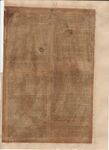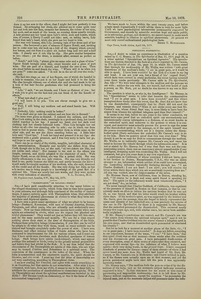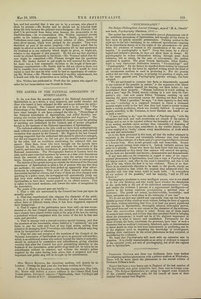"Elementaries" or Savages-Which?
Sir,—I have paid considerable attention to the many letters on the alleged elementary spirits, which from time to time have appeared in your columns, and although fully convinced of the reality of ancient magic, I cannot entirely agree with Theosophists when they attribute the majority of physical phenomena at seances to what they term sub mundane and depraved spirits.
I have seen a have seen a great many specimens of what we admit to human beings— Bushmen, Korrannas, wild men of Central America, Borneo, Patagonia, and other parts, who are ethically and aesthetically mere animals. Now (as these different human species have souls) when such spirits are attracted to circles, what can we expect but physical and trivial phenomena? They would act just as before they left this state, and be the same mentally and morally. We can for a time expect nothing above their state at the time of disintegration of the body. Perhaps these primitive beings (elementaries, if you like) can be willed by adepts to do what they wish them, much as many animals can be trained and brought completely under the power of men. I have seen Bushmen and other interior tribes of South Africa who have been sentenced to imprisonment for life for various crimes, and I must say that I have never seen elsewhere such diabolical specimens of human beings. Such beings have spirits (undeveloped), which may appear perhaps like animals or birds, owing to the grossly animal propensities and habits they had whilst in the flesh. It is my firm belief that the elementaries of the Theosophists are spirits of this class, who are what may be termed Diakkas and Bohemians in a spiritual sense. The expression of the countenance is the index of the mind. When the form is symmetrical and the expression angelic, the spirit should be likewise, and vice versa. I must say that the ideas of immortality are not very comforting, according to Theosophical. views.
I am now reading Isis Unveiled, and agree with nearly everything in it on Occultism, but that spirits do not materialise. After what I have witnessed, with tests, from my child, it seems to me to be sheer folly to attribute the production of manifestations to elementary spirits. What do Theosophists say about the spiritual manifestations recorded in the Bible? Bid Thomas touch an elementary, or was it the form of Jesus reincarnated temporarily?
We have much to learn within the next twenty years, and before adepts speak dogmatically I would advise them to wait for more light. Until we have psychological laboratories permanently supported by Government, and records by scientific societies kept and made public, as in astronomy, geology, and chemistry, we cannot expect to make much scientific headway in relation to spiritual phenomena. At present we must only record authenticated psychological facts.
Cape Town, South Africa, April 5th, 1878.
Perplexing Experienses
Sir,—I desire to relate an experience in illustration of a question raised by C. C. Massey, in The Spiritualist of Jan. 11, 1878, page 20, in a letter entitled “Speculations on Spiritual Agencies.” His speculations are therein directed to the facts at a seance reported by Mr. Carson, in The Spiritualist of Jan. 7th, page 10, in which Mr. Carson stated that through the mediumship of Mr. Wallis, was written “with great distortions of the medium’s body, ‘I am in great pain, or I would be able to speak. I have been wounded by the kick of a horse in my leg and head. I am not your son, but a friend of his’ (signed Burt),” which facts were correct in every particular, the event having occurred some three weeks previously. Mr. Carson adds in The Spiritualist, Jan. 4th—“We were total strangers to the medium and the persons we sat with; neither the son with me, nor myself, had ever heard of such a person as Mr. Burt, yet no doubt he was known to my son in Melbourne.”
The question is what is, or who is, the Intelligence? Mr. Massey, in his “Speculations,” seems to infer that because the communication read “I am in great pain. I have been wounded,” and this seance transpired three weeks after this event, that Mr. Burt did not know that he was disembodied, consequently that he (Burt) did not send the telegram, and reasons thus—“Must it not strike every one that Mr. Carson’s son, whose friend Burt was, is more likely to have been the source from whence the spiritual telegram sped than Burt himself?”
It seems to me that, before we can come to the latter conclusion, we must have some proof that an embodied spirit can unconsciously and unintentionally convey information to a distance, of an event known to the embodied spirit, and unknown to the persons to whom it is conveyed, and moreover must actually possess the power to sign the name of the disembodied spirit to the message, as if the spirit himself was the person communicating, which act is a forgery, unless the disembodied spirit (Burt) authorises the embodied (Mr. Carson’s son) to do so for him. Have we positive proof that this was ever done? Why should it not be as easy for Burt to communicate through the medium, Mr. Wallis, as to indirectly impress Mr. Carson’s son, and cause his mind to become the vehicle through which the information came? It is not so stated by Mr. Massey, but if true that Burt was not the communicating source, there was an inaccuracy almost unpardonable if any intelligent, designing spirit was controlling Mr. Wallis. But I will not comment, but give you some facts in my own experience.
A gentleman in California, of whose existence I did not know, gave to his brother in Boston, Massachusetts, U.S.A., who was an entire stranger to me, information which neither of us could have ascertained, the controlling influence repeatedly declaring through me, “I am Charles Goddard; I am not dead; I am alive; you will receive the letter within three days which you are so anxiously expecting from me.” All this was verified, also the subject-matter of the letter.
Mr. Herman Snow, now of California, then in Boston, standing by, said, “Of course he is dead, and some spirit friend is speaking for him.” The spirit (or the influence) would most vehemently affirm, “I am not dead,” &c., as before.
We never learned that Charles Goddard, of California, was cognizant of the presence of himself in Boston on that occasion, or that he consciously made an effort to inform his anxious brother that he was not ill, as was feared, and that his letter would reach his brother within three days. If his mother’s spirit, as was suggested by the brother and Mr. Snow, gave the message, then she forged or falsely represented the name and identity of her embodied son—a case precisely the reverse of the one in 'The Spiritualist, for there it is suggested by Mr. Massey that the embodied personated the disembodied. This occurred nearly twenty-five years ago, and, with similar cases, has never been satisfactorily explained.
If Mr. Massey’s conclusions are correct, and Mr. Carson’s son was “the source from whence the spiritual telegram sped,” may it not be possible that Charles Goddard was the source whence a telegram sped in his own name, and that no disembodied spirit personated or simulated his identity?
But let us look for a moment at another phase of the facts, viz., “I am in great pain; I have been wounded.” It does not follow, according to our experience, because of the tense, ‘‘I aw,” “I have been,” that this spirit (Burt) was at that moment—three weeks after the accident and his decease—in great pain. I have personated death-scenes of every description, some of them scores of years after they occurred, and expressed with mortal lips—by the influence of what I believe were spirits—their very dying words, in the present tense. I have examined hundreds of persons for disease—many of them absent—of whom I had never heard any more than Mr. Wallis had heard of Mr. Burt, Mr. Carson, or Mr. Carson’s son in Melbourne; and I have writhed in pain, as if the disease were actually upon me at that moment, and yet the person personated might have once felt the pain I was apparently agonising under.
Mr. Massey says, “The medium feels the pain as evinced by the distortions of the body, just as the mesmeric subject feels any sensation suggested to him.” In that statement lies the secret or true cause of personating and impressible mediumship; but it is left there by Mr. Massey without explanation, except the assertion “he personates the injured man, just as the mesmeric subject will personate under the influence of suggestion.” Yes, but who was the mesmeriser in this case? Who was it who gave the “suggestion?” Was Mr. Carson’s son the mesmeriser? was he the one who gave the suggestion—the one who signed “Burt” to the message, without knowledge or design on the part of the cause of the force which sped the telegram? Why should not Mr. Carson’s son unconsciously give the message, and sign Burt’s name, as well as C. Goddard speak a message through oneself, it may be asked? Perhaps it might have been done, but I should suppose it would have been quite as easy for Mr. Carson’s double to have given the facts and signed his own name, if the message sped from his brain, and if he was the cause of the signature “Burt.” In my case I suppose that it would have been more consistent for C. Goddard’s spirit mother, if she were the source of the intelligence, to have said so, instead of earnestly repeating through me, “I am not dead; I am Charles Goddard” (a name we had never heard before), and declare that she was alive and in California. This could not be true if the mother’s spirit was simulating her son. Here is a subject surely for investigation.
As I am perfectly conscious during these possessions, if possessions they can be called, I have the opportunity and ability to judge of their character quite as accurately as a casual bystander; his power is limited to what he may see and hear, whereas I have sensational emotions and perceptional impressions beyond the cognisance of the mere beholder or listener. In all candour and frankness, I confess that notwithstanding an almost uninterrupted experience of these interior influences for twenty-seven years, I am in doubt, or hold a suspended judgment, as to the promoting cause, or originating power.
I can only add, at the close of this unpremeditatedly lengthy letter, that I am in earnest in this matter. I have a knowledge of my own sensational, emotional, mental, and physical experiences, and am always willing to relate and describe them to the best of my ability. I have a philosophy of my own, which will cover a portion of the facts in my own possession, and perhaps a minimum of those of others. I know that these facts exist, and it is my intention to let them have full sway, having no fear of demons, but trusting that the facts may reveal in time their true cause and origin to those savants who are supposed to possess a deeper knowledge of metaphysics than myself, and a far wider experience in the Arcana of thought than has fallen to the lot of your humble correspondent.
No. 108, South Fourth-street, Philadelphia, Pa., U.S.A., April 22nd, 1878.
<Untitled> (Professor Zollner and Herr von Hoffmann...)
Professor Zollner and Herr von Hoffmann have been further investigating spiritual phenomena with a private medium at Wiesbaden. There will be more about the phenomena in the second volume of Professor Zollner’s book.
There has been a very heavy sale in England of the last number of The Spiritualist, and great quantities have been sent to foreign countries. The Belgian Spiritualists are going to import some hundreds of the pictorial supplement only, for the benefit of those of their number who cannot read English.
Editor's notes
- ↑ "Elementaries" or Savages-Which? by Hutchinson, Berks T., London Spiritualist, No. 298, May 10, 1878, p. 226
- ↑ Perplexing Experienses by Gipson, Ella E., London Spiritualist, No. 298, May 10, 1878, pp. 226-7
- ↑ Professor Zollner and Herr von Hoffmann... by unknown author, London Spiritualist, No. 298, May 10, 1878, p. 219
Sources
-
London Spiritualist, No. 298, May 10, 1878, p. 226
-
London Spiritualist, No. 298, May 10, 1878, p. 219



